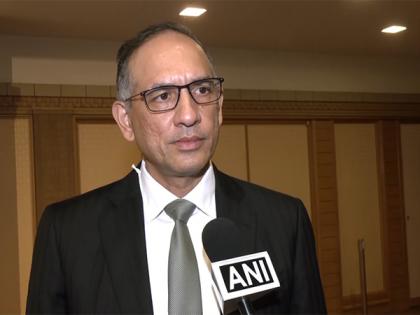India can be key manufacturing hub for Japanese companies amid global tariff barriers: Sumitomo Mitsui Banking Corporation's Rajeev Khanna
By ANI | Updated: August 29, 2025 20:30 IST2025-08-29T20:25:42+5:302025-08-29T20:30:08+5:30
Tokyo [Japan], August 29 : Japanese companies can look at India as a crucial market to sell their products ...

India can be key manufacturing hub for Japanese companies amid global tariff barriers: Sumitomo Mitsui Banking Corporation's Rajeev Khanna
Tokyo [Japan], August 29 : Japanese companies can look at India as a crucial market to sell their products and also make it a manufacturing base, as the Asian country grapples with tariff barriers according to Rajeev Khanna, Managing Executive Director and head of the India division at Sumitomo Mitsui Banking Corporation (SMBC).
"They (Japanese countries) see a very challenging market environment with particularly tariff barriers being imposed in a few countries and obviously a shrinking domestic market. So from that perspective, having the ability to cater to a very large market in India through their own products but also building and manufacturing in India to sell to the world I think is a real opportunity," Khanna said.
Speaking tofrom Tokyo during Prime Minister Narendra Modi's visit, Khanna noted that the auto industry and high-tech semiconductors present significant opportunities for Japanese firms in India.
"There could be a lot more done," he said. India's technical talent pool can support advanced manufacturing.
He added that several Memoranda of Understanding (MoUs) were signed during the prime minister's visit to Japan, but stressed that the key challenge is execution.
"The proof of the pudding will be how each of these Japanese companies will take the very specific step to put money and people in India. And I'm reasonably optimistic," Khanna supplemented.
"I think the key is how do we convert these MoUs into real investment. I believe some of these investments will take time because they are in complex industries and sectors."
He said the SMBC, which is one of Japan's largest banks, has continued to increase their presence in India and "we're looking forward to doing a lot more."
"My understanding is the Prime Minister of Japan also highlighted the ability of creating a win-win situation between the two countries, the ability of Japanese companies to use the domestic manufacturing base of India and the technical people of India to grow much more," Khanna said.
Khanna said that the Japanese Prime Minister stated that the Mumbai-Ahmedabad high-speed rail is just the starting point, indicating that there could be a lot more of this kind of investment coming in from Japan.
While Japan has already invested a substantial amount of foreign direct investment (FDI) in India, Khanna argued that the figure remains modest when compared to Japan's global FDI footprint.
"Actually, we should be looking at the greater opportunity. How can we attract a lot more of that FDI flow from Japan into India," he said.
Addressing the India-Japan Forum, organized by the Confederation of Indian Industry and Keidanren [Japan Business Federation] in Tokyo, PM Modi pitched for a partnership with Japan in the area of manufacturing with special focus in the fields of batteries, robotics, semiconductors, ship-building and nuclear energy. Other areas for partnerships include, technology, innovation, green energy, and skill development, he said.
"In manufacturing and the auto sector, our collaboration has been highly successful as the Prime Minister (Shigeru Ishiba) has already elaborated. We can create the same magic together in batteries, robotics, semiconductor ship buildings and nuclear energy," Prime Minister Modi said.
Inviting Japanese companies to further enhance their footprint in India, he noted that the Indian growth story presented exciting opportunities for them.
Leading industry figures from India and Japan, including CEOs of the India-Japan Business Leaders' Forum, participated in the key business meeting.
At the invitation of Prime Minister Shigeru Ishiba, PM Modi is on a two-day visit to Japan for the 15th Annual Summit.
Disclaimer: This post has been auto-published from an agency feed without any modifications to the text and has not been reviewed by an editor
Open in app